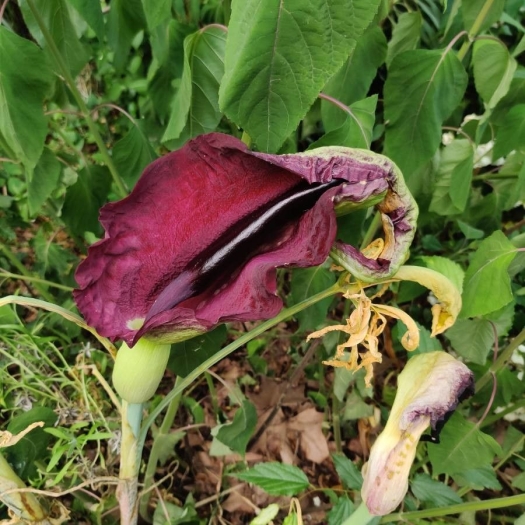Dragon Arum
(Dracunculus vulgaris)
Dragon Arum (Dracunculus vulgaris)
/
/

Louis SCHILLER
CC BY-SA 4.0
Image By:
Louis SCHILLER
Recorded By:
Copyright:
CC BY-SA 4.0
Copyright Notice:
Photo by: Louis SCHILLER | License Type: CC BY-SA 4.0 | License URL: https://creativecommons.org/licenses/by-sa/4.0/ | Attribution: Louis SCHILLER (cc-by-sa) | Rights Holder: Louis SCHILLER | Publisher: PlantNet | Date Created: 2020-06-01T17:05:34.073Z | Title: Dracunculus vulgaris Schott: flower | Notes: |




















































Estimated Native Range
Summary
Dracunculus vulgaris, commonly known as Dragon Arum, is a semi-deciduous perennial herb native to rocky hillsides, open woodlands, and scrub areas in the Mediterranean, Aegean Islands, and the Balkans. It typically grows to a height of 20-40 inches (50-100 cm) and spreads 12-24 inches (30-60 cm). The plant is notable for its striking appearance, featuring a large, deep purple spathe and a central blackish-purple spadix that emits a foul odor resembling rotting meat to attract its primary pollinators, flies from the genus Lucilia and others. The large palmate leaves are glossy green with occasional cream flecks along the veins. Dragon Arum is also thermogenic, capable of heating its spadix to approximately 18 degrees Celsius above ambient temperature, which may help disseminate its scent and provide warmth to visiting insects.
Dragon Arum is valued for its dramatic and exotic-looking flowers, which bloom in late spring to early summer. Despite its unpleasant smell, the plant is often used in gardens for its unique aesthetic. It is suitable for border planting, as a specimen in garden beds, or in naturalized areas. Dragon Arum requires a humus-rich, well-drained soil and can tolerate some drought once established. It prefers full sun to part shade and benefits from consistent moisture during the growing season. While generally low-maintenance, it can be susceptible to root rot in overly wet conditions and may be considered invasive in some areas outside its native range due to its ability to self-seed.CC BY-SA 4.0
Dragon Arum is valued for its dramatic and exotic-looking flowers, which bloom in late spring to early summer. Despite its unpleasant smell, the plant is often used in gardens for its unique aesthetic. It is suitable for border planting, as a specimen in garden beds, or in naturalized areas. Dragon Arum requires a humus-rich, well-drained soil and can tolerate some drought once established. It prefers full sun to part shade and benefits from consistent moisture during the growing season. While generally low-maintenance, it can be susceptible to root rot in overly wet conditions and may be considered invasive in some areas outside its native range due to its ability to self-seed.CC BY-SA 4.0
Plant Description
- Plant Type: Herb
- Height: 2-3 feet
- Width: 1-2 feet
- Growth Rate: Moderate
- Flower Color: Purple
- Flowering Season: Summer
- Leaf Retention: Semi-Deciduous
Growth Requirements
- Sun: Full Sun, Part Shade
- Water: Medium
- Drainage: Medium
Common Uses
Bank Stabilization, Bird Garden, Fragrant, Low Maintenance, Showy Flowers
Natural Habitat
Native to rocky hillsides, open woodlands, and scrub areas in the Mediterranean, Aegean Islands, and the Balkans
Other Names
Common Names: Dragon Arum, Dragon-Lily, Devil’s-Tongue, Vampire Lily, Schlangenwurz, Drachenwurz, Gewöhnliche D., Drakkalla
Scientific Names: , Dracunculus vulgaris, Arum dracunculus, Dracunculus dracunculus, Dracunculus creticus, Dracunculus polyphyllus, Dracunculus vulgaris var. laevigatus, Aron dracunculum, Arum guttatum, Dracunculus dracunculus publ
GBIF Accepted Name: Dracunculus vulgaris Schott